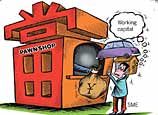
Ma also set up a strategic committee under the board of directors and an operational committee to be overseen by the CEO to separate long-term vision from day-to-day business.
"Alibaba's challenge is to remain swift in the fast-changing Internet market, and the split-up will enable each unit to be more competitive in each field," said Li Zhi, a principal researcher at Analysys International.
The latest reconfiguration of the company came after it was divided into seven major business groups last July.
Other domestic Internet companies, such as Baidu and Tencent, have undergone similar restructuring in recent years to cope with rising competition posed by hungry start-up firms.
There's nothing to suggest that Ma's influence over the company will be diminished, however.
"Alibaba needs to put more focus on innovation, with new e-commerce companies and start-ups emerging in recent years," said independent e-commerce consultant Lu Zhenwang. "Ma can now concentrate on strategies after stepping down as CEO."
China is home to the world's largest Internet population, but even at a penetration rate of 42 percent, the growing number of new users still lags penetration rates as high as 70 percent in developed nations. That leaves wide scope for expansion.
E-commerce transactions account for a mere 5 percent of China's retail trade, and still to be tapped are vast inland regions where online shopping has yet to gain the popularity it enjoys in coastal cities.
Last May, Alibaba entered into an agreement to buy back 20 percent of its stake from Yahoo Inc for US$7 billion, regaining control of itself while also paving the way for a future initial public offering.
Minority investors
It is also entitled to buy back another 10 percent stake from Yahoo at the same price should the IPO be completed by the end of 2015. Alibaba also took its Hong Kong-listed B2B unit private after paying US$2.5 billion to minority investors.
Such a sprawling enterprise, with a payroll of 24,000 workers, is not without its internal management problems.



















![]()
